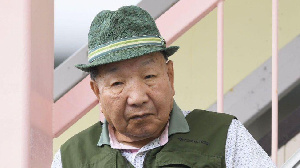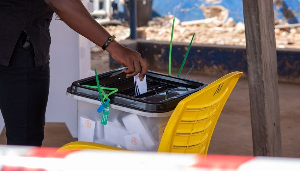One Japanese court don free 88-year-old man wey be di world longest-serving prisoner wey dey on death row.
Di court free am afta dem discova say di evidence dem use against am wey land am for jail na fake.
Dem find Iwao Hakamada, wey don dey on death row for almost half a century guilty for 1968 on top accuse say e kill im boss, di boss wife and dia two teenage children.
Na recently court grant am retrial of di case, as suspicions bin dey say investigators fit don plant evidence wey make dem sentence am for quadruple murder.
Di 46 years e spend on death row don take heavy toll on Hakamada mental health, e no even fit attend di hearing wia dem finally declare say im dey innocent.
Hakamada case na one of Japan longest and most famous legal sagas. E bin attract widespread public interest, as some 500 pipo line up for seats for di courtroom for Shizuoka on Thursday.
As di judge announce di verdict, Hakamada supporters wey dey outside di court begin shout “banzai" - one Japanese exclamation wey mean "hurray".
Hakamada, wey dey exempted from all hearings sake of im deteriorated mental state, don dey live under di care of im 91-year-old sister Hideko since 2014, wen dem free am from jail and grant am retrial.
She bin fight for years to clear im name. She tok say e dey sweet to hear di words "not guilty" for court.
"Wen I hear am, I bin dey so moved and happy, I no fit stop to cry," she tell tori pipo.
Her brother bin don tok before now say im battle for justice be like say "im dey fight for boxing ring every day". "Once you reason am say you no fit win, path to victory no dey be dat," e tell AFP news agency for 2018.
'Bloodstained' clothes in a tank of miso
Hakamada na former professional boxer. E bin dey work for one miso processing plant for 1966, wen dem recover di bodies of im employer, di man wife plus dia two children from one fire incident for dia house for Shizuoka, west of Tokyo. All four of dem bin de stabbed to death.
Authorities bin accuse Hakamada of murder, say na im murder di family, set fire to dia house and tiff 200,000 yen in cash.
Hakamada bin initially deny say im robb and murder di victims, but e later give wetin e describe as forced he confession afta beatings and interrogations wey pass more dan12 hours a day.
For 1968, court bin find am guilty of murder and arson, and dem sentence am to death.
Di case wey bin drag for many decades, bin take a different turn wen investigation bin discover some clothes for inside di tank of di miso, one year afta Hakamada arrest. Na those clothes, wey reportedly dey bloodstained, dem use set am up.
For years, however, Hakamada lawyers bin argue say di DNA dem recover from di clothes no match om own.
E bin raise di possibility say di items fit belong to someone else.
Di lawyers bin also suggest say police fit don fabricate di evidence.
Dia argument bin no dey enough to persuade Judge Hiroaki Murayama, wey bin note for 2014 say "no be di defendant get di clothes”.
Free at last
"E no dey just to detain di defendant further, as di possibility of im innocence don become clear to a respectable degree,” Murayama tok dis time.
Den dem release Hakamada from jail and grant am retrial.
Prolonged legal proceedings mean say e take dem until last year to begin di retrial - and until Thursday morning for di court to declare di verdict.
Di details of wetin finally clear am for di case na di nature of di red stains on di clothes prosecutors bin claim say na im own.
Di defence bin question how di stains no clean afta many years. Dem tok say di fact say di stain still dey red and no turn black afta extended time dem put am for soybean paste mean say di evidence dey fabricated.
Thursday ruling see say "investigators bin tamper wit di clothes by putting blood on dem" wey dem come hid for di tank of miso, according to AFP.
Di court declare Hakamada innocent.
Decades of detention, mostly fir solitary confinement plus di ever-present threat of execution, don take heavy toll on Hakamada mental health, according to im lawyers and family.
Im sister for long bin beg for im release. Last year, wen di retrial start, Hideko bin express relief and say "finally dis weight don comot from my shoulders".
Retrials for death row inmates no dey common for Japan - Hakamada na only di fifth pesin for Japan post-war history.
Along wit di United States, Japan na di only G7 kontri wey still dey impose capital punishment. And dem dey tell death row prisoners of dia hanging just a few hours in advance.
Click to view details



BBC Pidgin of Thursday, 26 September 2024
Source: BBC




















